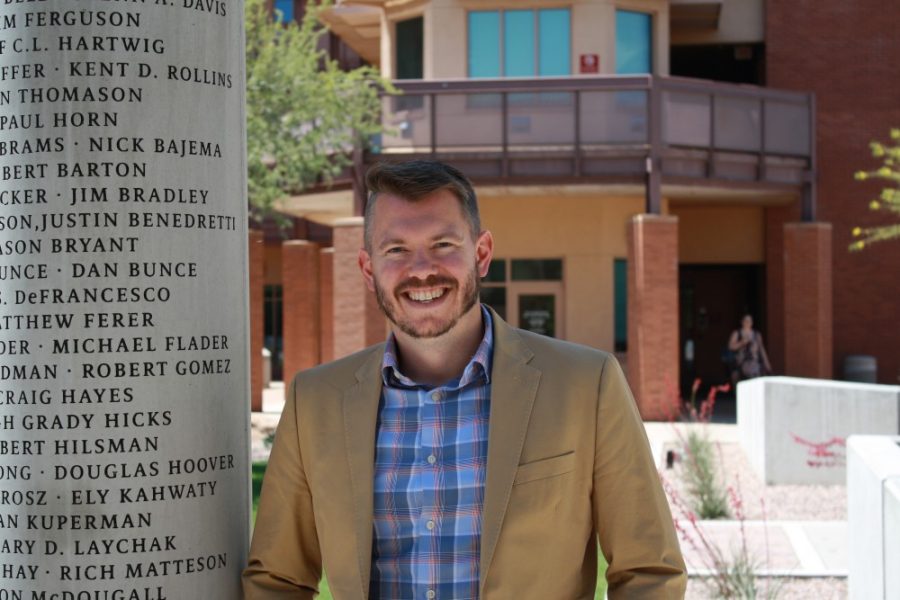Robert Stephan was recently awarded the 2019 College of Humanities Distinguished Undergraduate Advising/Mentoring Award, and the Daily Wildcat sat down with him and asked him some advising tips and tricks. The interview has been edited for length and clarity.
Daily Wildcat: First off, why do you feel you were chosen for this award, and how does it feel to have won it?
Robert Stephan: It feels great to be both nominated and chosen by my colleagues. The reason I think I won is kind of a twofold answer. One part is the big picture/quantitative aspect that has to do with bringing in majors. So over the past two years with the Classics major, we’ve jumped from 32 majors to around 75-80 majors, basically a 115 percent increase over the past 18 months. It’s really great, because it goes against national trends. The other thing is that I’ve had a lot of success connecting with individual students, and at a huge university like this, it’s kind of easy to get lost and feel like a number. So, one of the things I’ve put a big emphasis on is to try to connect in a very human way with students and make them feel like a very integral part of the program here.
DW: What are some advising tips you have for students, in general and regarding finals?
RS: In general, students have four years here to get prepared for what they want to do afterwards and to study whatever they want. I advise to do both of those things and make sure to be well prepared for what they want to do after school, whether it be law school, med school, business school or getting a job and making sure they have the skills to do that. Also, whenever someone leaves the UA campus, they’ll be going into the real world, even if it’s called school. I say to find their passion, whether it be French, astronomy, studying Ancient Greece and Rome in the Classics program. Just develop an expertise in something they are truly passionate about, as well. Another thing I recommend is to connect with professors. It’s a big school, and professors have a lot students. Sometimes it’s hard to reach out to students, but we get really excited when students take an interest in our research and teaching. That being said, if people are able to reach out to professors and ask [for] opportunities, we very frequently have a lot of those available. Regarding finals, start studying early. It also doesn’t hurt to go to your professor and say, ‘Thank you for teaching a great course, I’m studying for finals,’ and ask if they have any studying tips. Also make sure to go to review sessions.
RELATED: From Argentina to Arizona: One student’s journey navigating America
DW: What things do you notice students do often wrong when coming to an advising appointment?
RS: One of the big things, at least for the Classics program: Students come in really wanting to know which classes to take. I’m happy to tell them the requirements for the major, otherwise it’s really up to what the student wants to take. I would say to think of the type of class you would want to go to simply for the purpose of learning.
DW: How often should students come and see their adviser?
RS: At the very least, once a year, but the more the better. Students want to make sure they’re on the right track for the major. Advisers are very frequently aware of some of the cool opportunities students have, and that could be internships, study abroad opportunities, cool new courses that the student might have interest. Overall, the more time you spend with your adviser, the more students can be aware of those things, and getting access to those opportunities usually has a big payoff at the end when a student is looking at jobs or applying to grad school.
DW: Why is it important students have a good relationship with their adviser?
RS: An adviser is going to have the time and responsibility to guide a student in their next steps, so the better the relationship, the more personalized guidance they can give a student. Different opportunities can come across an adviser’s plate, so the better they know a student the more an adviser can keep that student in the loop.
DW: Is there anything else you would like to share with students?
RS: It’s really great to see how Classics has grown over the past two years and plans to keep growing. With the award, it was only possible because of my colleagues as well. A huge part of this is students starting their classes, getting them passionate about Classics, Ancient Greece and Ancient Rome, and then when they show up in my office to talk about majors and minors, and I just continue to foster their interest.
If you don’t know who your adviser is or where to make an appointment, visit advising.arizona.edu.
Follow Margaux Clement on Twitter









